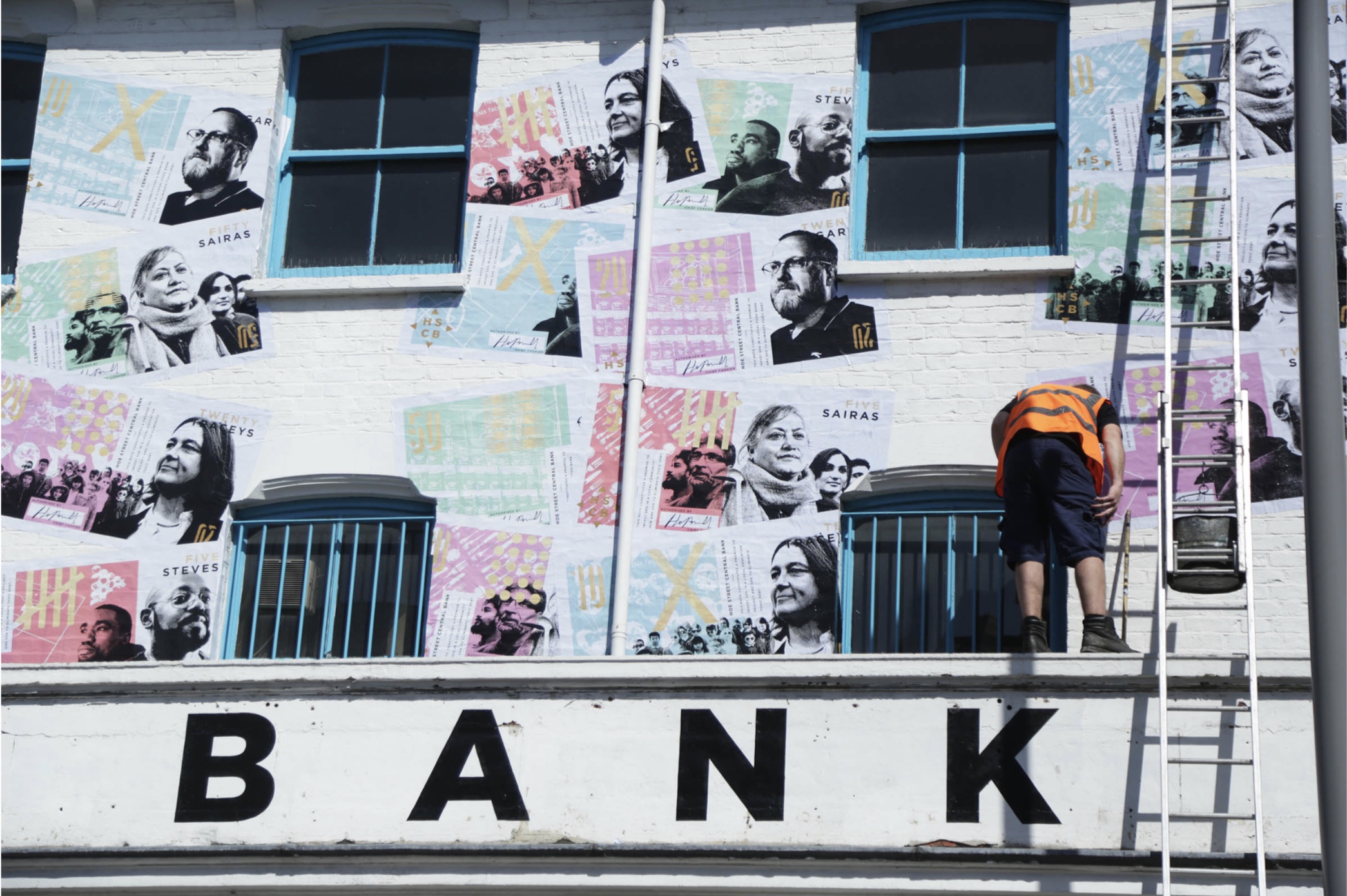“We’ll be blowing up the van full of the debt in front of the city towers,” says Dan, who also plans to offer the remains of the van to backers as “interest” as well as melting some of it down to create commemorative coins. “We have a spot in the Docklands and you can see the HSBC tower in the background – that’s where we’ll be blowing up the HSCB bus. We’re calling it Big Bang 2.0 in reference to Margaret Thatcher’s Big Bang in the Eighties. We see what we are doing as the logical conclusion of where the Big Bang has left us.
“Because we have had so much political paralysis in the last few years it feels like we are just drifting off to sea. Part of that paralysis is that nothing positive has been coming out of Westminster and so we thought what would it look like if we ran the Bank of England? What would we change about our financial system?”
Inspiration for the project came from Strike Debt rising up from the ashes of the 2008 financial crisis and Occupy Wall Street movement. They opted to wipe student and medical bills in the US, but when that was not an option for a UK version Dan had a clear target in mind.
“We chose payday loan debt because it is pretty clear in terms of the moral argument where it stands when people are paying more than 1,000 per cent in interest,” he says. “It gave me a huge sense of injustice about how warped and unbelievable the financial system can be.
“Strike Debt believe that when people learn how the secondary debt market works it is a little bit of power for them as it can help them renegotiate their own terms.”
Dan believes that sovereign money creation may be the way forward, using the government to create debt-free, interest-free money to slash the payments made to profit-chasing private banks. They are not the only ones with their own ideas of standing against debt – Debt Resistance UK were also inspired by Strike Debt to produce a UK version of their Debt Resistor’s Operations Manual. The activist network is currently targeting local authorities rather than individuals when it comes to problem debt and is taking aim at LOBO (Lender Option Borrower Option) loans taken out by councils from private banks.
Advertising helps fund Big Issue’s mission to end poverty
Can you just cancel it?
Blowing up a van may well turn a few heads in December, but waving goodbye to distressed debts could be achieved just as easily in the corridors of power. Dr Johnna Montgomerie is a reader in International Political Economy at King’s College London and is publishing a book called Should We Abolish Household Debts? in March.
And for her, debt cancellation is not just a quick and easy way to end the psychological warfare of letters and phone calls demanding payment. It is a way of crushing the stigma of debt that goes all the way back to Victorian times.
“I’m quite a strong advocate of debt cancellation – in the end I think it is the only way we are going to finally finish the process of regulating the financial system that we started 10 years ago,” says Dr Montgomerie. “Long since the banks were bailed out with billions of pounds, the consumer has been sold out. They are told they must honour their debts to banks that have not had to repay their own.
“What is needed is a financial and practical settlement between the people and the banks and there must be risk-sharing between the two. I think that the arguments against that are highly moralistic and more than 150 years since debtors’ prisons were abolished, the perception of debt is still about shaming people.”
Rather than a detonation on the streets of London, the changes that could be made to the financial system would reward banks with a tax break for writing off the debt rather than the same reward for selling it on and getting it off their balance sheet. That way there would be no need for projects like The Bank Job or Strike Debt.
“If you told lenders that they would get a tax break for cancelling debt instead of selling it then debt cancellation may be a reality,” says Dr Montgomerie. “It would only take changing a couple of lines of legislation but that would depend
on there being the appetite to do that.
Advertising helps fund Big Issue’s mission to end poverty
“I think that there needs to be closer monitoring of the secondary market. It’s a very grey market where there is not much scrutiny of its practices. All the power is with the lenders and it is not consumer friendly – you can get so far down the process before anyone even realises that the contract you signed is not worth bothering with.
“It’s time that the UK and the US got out of this Wild West mentality of chasing debts – we are supposed to be living in a civilised world after all.”
The future of fair credit
If we had the power to quash debt, is that not just a get-out-of-jail-free card for those who are in the deepest mire? The reality is that slipping into debt for many is not a result of over-spending, it’s down to wages not stretching far enough or something as simple as a broken washing machine. It’s expensive to be poor, as The Big Issue has highlighted many times.
Big Issue founder John Bird is bringing his private member’s bill through the House of Commons to help everyone access to fair credit. His Creditworthiness Assessment Bill aims to modernise the lending process by ensuring credit service providers take into account rental and council tax data with the consent of the individual.
So paying rent and council tax on time will allow the renter to build up credit file data in the same way as paying a mortgage, potentially improving your chances of attaining affordable credit. Due for its second reading in the House of Commons later this month, the legislation would prevent the most vulnerable from falling victim to the high-cost poverty trap and being trapped in a spiral of problem debt.
It is an important step to enable fair access to credit for people buying everyday basics, like a mobile phone or white goods, and to prevent them falling into the high-interest agreements that lead to life-changing defaulted debts. The reality is that the economy will never be without debt. It is hardwired into it. But maybe cancelling overdue debts is possible – without blowing them up in a transit van.
Advertising helps fund Big Issue’s mission to end poverty
Image: Dan Edelstyn/Hoe Street Central Bank









